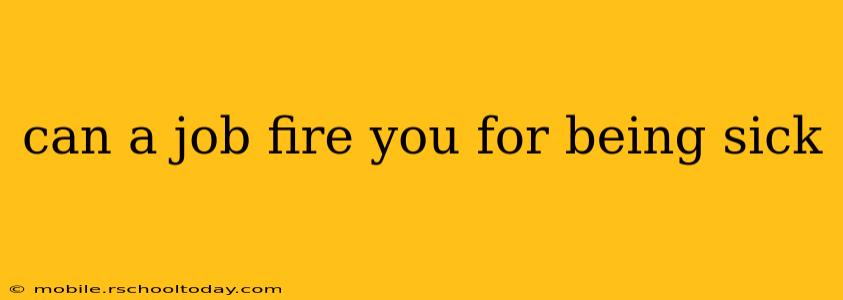Can a Job Fire You for Being Sick? Navigating Illness and Employment
The question of whether an employer can fire you for being sick is complex and depends heavily on several factors, including your location, the specifics of your illness, your employment status (e.g., at-will employee, contract worker), and your company's policies. While outright dismissal for illness alone is often illegal in many places, the situation is nuanced. Let's break down the key considerations.
What are my legal protections against being fired for illness?
Your legal protections against termination due to illness largely depend on where you live and the type of employment you have. In many countries and states, laws exist to prevent discrimination against employees based on disability, including illnesses. These laws often require employers to make reasonable accommodations for employees with disabilities, allowing them to continue working. However, “reasonable accommodation” doesn't mean the employer must allow an employee to be absent indefinitely. The definition of "reasonable" varies based on the specific circumstances.
These protections generally apply to serious, long-term illnesses, not short-term absences due to common colds or flu. The specifics of these laws vary widely, so understanding your local employment laws is crucial. Consulting an employment lawyer in your area is advisable if you face such a situation.
Does the type of leave I take affect whether I can be fired?
The type of leave you take significantly influences your job security. If you're using protected leave (such as FMLA in the United States or similar legislation in other countries), your employer is legally restricted from terminating your employment due to the illness necessitating the leave. However, it's important to understand that even with protected leave, there might be specific conditions that need to be met. For instance, you might need to meet specific eligibility requirements related to the length of your employment or the seriousness of your condition.
Unprotected leave, on the other hand, offers fewer safeguards. While employers can't discriminate against you because you're sick, they often have more leeway to terminate you if you're frequently absent, even if the absences are due to illness. This highlights the importance of following your company's attendance policies and communicating effectively with your employer.
What if I have an excessive number of sick days?
Excessive absenteeism due to illness can be grounds for termination, even in jurisdictions with strong employee protection laws. The definition of "excessive" varies by employer and often depends on company policy and the nature of your job. Consistent, unexplained absences or frequent short-term absences can lead to disciplinary action, ultimately resulting in termination. Open communication with your supervisor about health concerns and any potential long-term absences is crucial.
What if my employer says my illness is affecting my job performance?
If your employer claims your illness is affecting your performance, this situation becomes more complex. While they can't fire you solely for being ill, consistent poor performance directly attributable to your health condition may provide grounds for termination. In such cases, the employer might need to demonstrate a clear link between your illness and your decreased performance. Furthermore, they may be obligated to offer reasonable accommodations to help improve your performance.
What are my rights if I believe I was unfairly fired for being sick?
If you believe you were unfairly terminated due to illness, it's essential to seek legal advice immediately. An employment attorney can review your situation, evaluate your rights under applicable laws, and guide you through the process of filing a claim if necessary. Documentation of your illness, communication with your employer, and any company policies regarding sick leave will be crucial to your case.
In summary, while being fired simply for being sick is often unlawful in many places, frequent absences or performance issues linked to illness can lead to termination. Understanding your rights, adhering to company policies, and maintaining open communication with your employer are critical to protecting your job security. If you face such a situation, seeking legal counsel is highly recommended.
